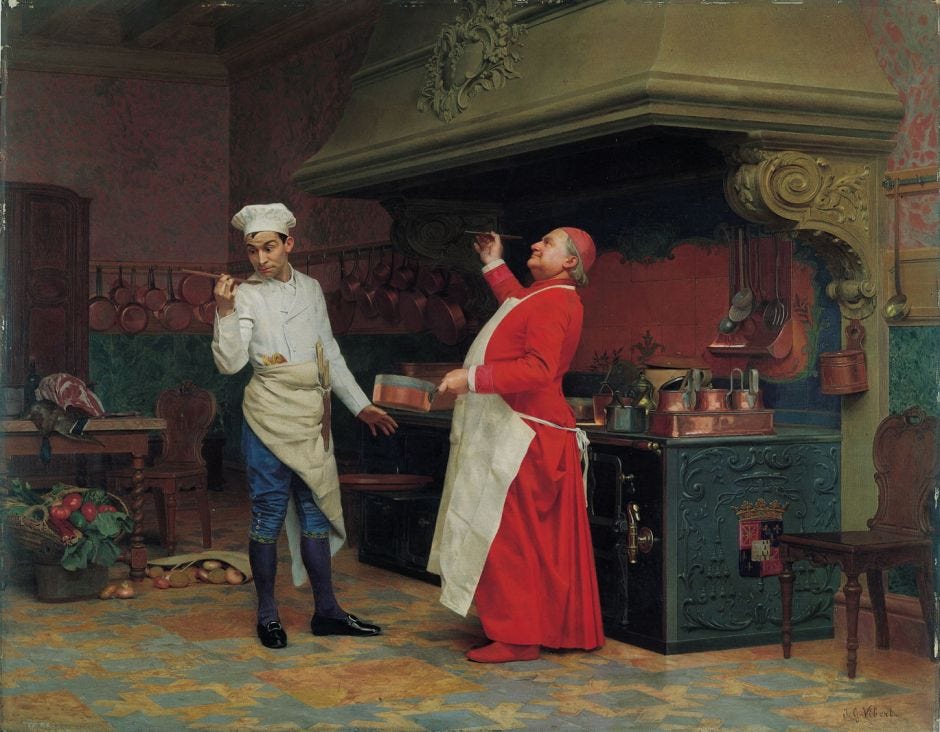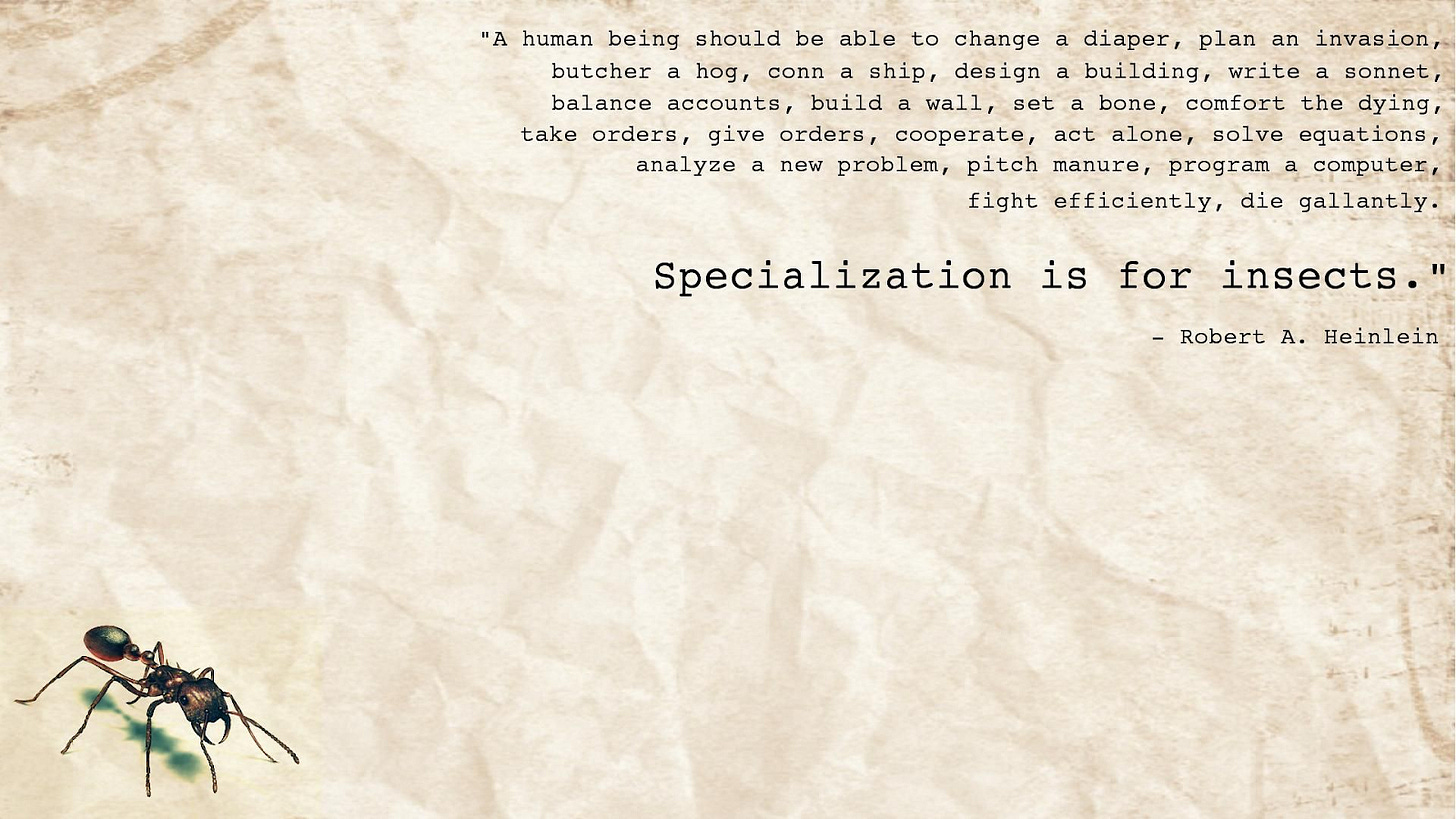Hand above the pan
The difference between a good day and a great day is whether I cooked. It could be something as simple as oven-baked salmon or as technical as seafood risotto. But the more complex the recipe, the longer the prep time, and the more points there are to influence (or botch) the flavour, the more joy I feel. And it’s more than joy. It’s equal doses of accomplishment, discovery, and connection.
My favourite polyglot Kato Lomb wrote that “we should study languages because languages are the only thing worth knowing even poorly”. Cooking is similar in that regard. The difference between not knowing and knowing how to fry potatoes is massive. Frying potatoes for the first time is like learning your target language’s version of “¿Dónde está la biblioteca?”. On a side note, the first time I tried frying something (I must have been twelve), I simply put dry pasta in a hot, unoiled pan. The thing that came out was vantablack.
In my late teens and early twenties, I learned how to cook. Or so I thought. As a LAPRing vegetarian/vegan, I knew a few ways of making a mean stew and soup. Eggplant, button mushrooms and lentils were my staples. Some of my food looked like brown gunk, some of it looked alright. I would go heavy on spices, because that’s what you do when you have zero technique. The food ends up tasting like the spices and not the ingredients you use. Spices are like good annunciation – they help, but they can only cover so much.

If cooking is a language, and I certainly believe it is, for most of my life as a home cook I was at a A2 threshold level – good enough to impress people who don’t cook and with some additional effort please even those who do. For a long time, my recipe rotation was a handful of plant-based dishes (and a dozen versions of scrambled eggs). I liked all of them but there was nothing inspiring about them anymore. Pure sustenance with a once-in-a-blue-moon festive dish, like homemade falafel, thrown in.
Having dumplings in the freezer and pre-marinated chicken thighs in the fridge helped reduce the time spent thinking about what to eat. Then food delivery became a thing and variety could be supplied to the table not just from the local pizza joint but from almost any place that had a stove. During lockdowns, ordering from your favourite Vietnamese cafe was seen as a moral duty - the only way to support a struggling business.
And while lockdowns are a thing of the past, the habit of ordering a hopefully-still-hot-when-it-arrives meal with a few taps stuck. But after the novelty wears off, all takeaway tastes the same. Disappointment wrapped in aluminum foil. It was probably this disappointment, coupled with inflation - both the economic and wasteline-related kinds - that drove me to the kitchen. I started with the five dishes I knew how to quick and started adding new recipes every week. And I got hooked.
Spending more time in the kitchen changed the way I look at food. I became more curious about different ingredients, and nothing excites me more than a visit to an Asian food store or the local market. I started noticing subtle differences in meat cuts, sauces, different types of onions and other vegetables. The culture war topics of my YouTube feed are now distilled with recipes and cooking show highlights. And you bet I replicate the same pasta recipe that Jon Favreau made for Scarlett Johansson in Chef the same evening I watched the movie.
Of course, if it's drama you're after, the cooking world has aplenty. Cast iron vs. stainless steel, gas vs. electric, charcoal vs. butane. When to season? How long to let the sauce simmer? Everyone has an opinion on everything. Not to mention actual culture wars (Is hummus Israeli or Lebanese? Is pineapple on pizza akin to genocide?) The entertainment value is just priceless.
Cooking more means I also notice more things related to making food. I’ve got my pet peeves, like people on cooking shows using the sharp side of the knife to scrape food off the cutting board. I’ve also internalised a fair bit of unsubstantiated chef science. I don’t know if pouring oil into a cold pan leads to anything bad but I’m not going to risk it. The same goes with seasoning eggs before frying them and many other rules that probably have no substance. At least I’m not one of those people who add olive oil to their pasta water.
One other thing I noticed is that I don’t really enjoy food in restaurants. It might taste well but not knowing how something was made, not being there to feel the heat of the pan, not being the one who tastes the dish five times before it reaches the table means that I lose something meaningful.
I also started looking with suspicion at people who trying out new restaurants but at the same time don’t know how to cook. Foodies are the posers of the food world. They’re like people who don’t listen to full albums. You shouldn’t trust them.
When I was a kid (all right, all right, when I was in my late 20s), this was my desktop:

““A human being should be able to change a diaper, plan an invasion, butcher a hog, conn a ship, design a building, write a sonnet, balance accounts, build a wall, set a bone, comfort the dying, take orders, give orders, cooperate, act alone, solve equations, analyze a new problem, pitch manure, program a computer, cook a tasty meal, fight efficiently, die gallantly. Specialization is for insects.”
This was my version of hustle porn. Although, as far as hustle porn goes, this would go into the mild category. And while I no longer start my day with a Robert Heinlein quote, doing something with my own hands brings me immense joy. The highlight of my Christmas holiday? A fixed bedlight. The highlight of last week? Homemade ribs.

Member discussion